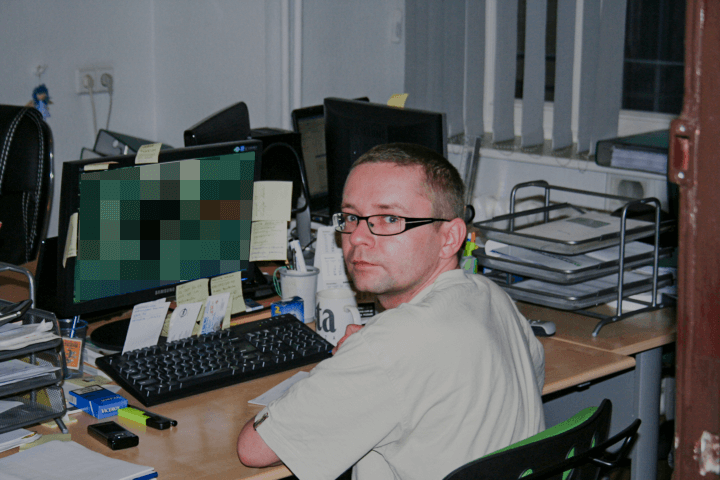26 November 2021
Career pivot into IT. People of TSH prove that switching your job to tech is doable

Is the career path you’ve picked not to your liking anymore and you’re hopelessly bored with your current job? Maybe you’re underpaid, managed by unsupportive supervisors, have no opportunities to grow, or search for a better work-life balance? No matter your reasons (all valid!), work experience, or age, a career pivot into IT is 100% possible, and personal stories of our amazing The Software House people are here to prove it.
According to research – no matter if it’s Forbes, Boston Consulting Group, or Fast Company – the most innovative companies are closely tied with technologies and software development. Their market advantage after all is based on exquisite applications or providing various solutions for others.
In this environment, it’s no wonder that the IT industry constantly looks for staff. We have already covered the software engineers shortage and how the war for talent especially shapes the markets of technology hubs. If you need an example, we’ve analyzed how the situation looks like with the top software companies in the Netherlands. Not to mention that Covid-19 made the shortage of IT professionals even worse.
That’s the business perspective but behind every successful company and product are living and breathing human beings that look for personal satisfaction.
Breaking into the IT industry is obviously hard but, at the same time, easier than ever. Harder because, as you will see from the upcoming stories, it takes persistence and time to learn what you need to know. Easier, because resources are accessible all over the internet for anybody willing to learn.
So I asked the people of The Software House to share their personal journey to the IT industry. Amongst them, we have musicians, teachers, historians, shopkeepers, psychologists. People with a higher education that completely snubbed their degrees, and moms who self-taught during their maternity leave. Young and middle-aged. People who got support from their friends and family, and those who got discouraged and misunderstood.
Let’s meet them…
Changing career to software development
Robert Goik. Chemist-metrologist turned frontend developer (In IT since 2018)

📖 My story:
My previous profession was so systematized, heavy on documentation and standards for accredited laboratory management. I worked on international certifications for thermal devices (e.g. thermometers and drying ovens). I was so bored with mountains of paperwork, and I needed to leave.
I chose IT because I naturally possess good problem-solving skills. My first contact with the industry was in my previous job, I tried to introduce some improvements to facilitate my work in the lab. I’ve learned a bit of Python – the most pleasant programming language to start with, I think – and started with Visual Basic for Applications (basically Google Sheets on steroids), and followed with this program for a microscope (it gave you 100 results and Python converted and presented them in docs format). There was also a backend episode when I tried our Ruby on Rails, built a server on an old computer, and made a simple CRM.
After those initial experiments in the lab (pun intended) I wasn’t afraid of the change. Software development focuses on solving even the tiniest issues to make the whole system better, which is basically what I did myself. I quite enjoyed learning new things and IT is so dynamic that it can’t be compared to any other industry. Nothing is ever done the same way.
🎯 How my previous job turned out to be useful in IT:
Contact with customers. Now I have no problem with negotiating with our clients nor public speaking. I always use opportunities to speak during planning or discuss projects.
🧠 My advice for people pivoting their career:
Don’t get discouraged. IT requires a sacrifice – mostly time to sort and figure everything out. It doesn’t matter whether you pick front or back. Language composition is of little importance. The most important thing is to learn to solve problems.
Three months before I started working at The Software House, I didn’t know what “frontend development” was. The only reason why I ended up in frontend was that I hated PHP syntax. Maybe if at that time API was being done in Node, I would choose backend. I loved React which was very consistent and required programming in JavaScript. What’s more, React.js is an unopinionated framework that gives you a lot of flexibility to create things however you like. And poof – that’s how a frontend developer was born.
👨💻 How can a company deal with and benefit from hiring juniors:
When composing recruitment tasks – test how people think and how they approach problems. That’s the best way to assess potential. If you invest in people who maybe don’t have a full set of skills at the beginning but genuinely enjoy cracking cases, after some time they will transform into the best software developers you can wish for.
Dariusz Wójcicki. Finance manager turned PHP developer (in IT since 2016)

📖 My story:
I’ve taken my first steps in programming back in the finance bureau. Honestly, I didn’t consider changing my profession. Or at least it wasn’t my goal when I started exploring PHP. It was more out of necessity, to refine and speed up repetitive invoice processing. Basic PHP knowledge allowed me to write a program for monitoring invoices. If the payment isn’t received after the deadline, the invoice was automatically sent for further processing via appropriate procedures.
This little project opened the IT door for me. After that, I’ve become a PHP developer-freelancer for a bit and then found The Software House.
🎯 How my previous job turned out to be useful in IT:
Definitely strict work organizational ethics. Thanks to it, I’m great at assigning priorities (or not) for tasks and helping my team to break down jobs into smaller parts so the project doesn’t seem overwhelming.
🧠 My advice for people pivoting their career:
The most important are persistence, time, and willingness.
Check out tutorials for various technologies and think about what makes you tick. Organize your day, so you find even an hour daily to go through the basics of the programming language you’ve liked. Once you start exploring the subject and gain some knowledge and skills, you’ll grow ideas to use them in practice.
I also recommend finding someone who has more experience in the subject to help you. With an insightful mentor, you’ll be able to acquire good practices. You can find people within online communities or, if you’re afraid of the risk, switch your current job to part-time and land an internship in a software company.
👨💻 How can a company deal with and benefit from hiring juniors:
Less experienced people can be a great addition to already existing teams. They will observe the work of experts in a real environment and help them with less complicated tasks. Having colleagues verify work during code reviews is extremely beneficial, and gives people a sense of pride and accomplishment that even with the limited knowledge they’ve had a little contribution to a real project!
Jakub Szeja. Professional guitarist tuned frontend developer (in IT since 2018)

📖 My story:
In Poland, it’s practically impossible to make a living only from performing as a classical guitarist. The other option is teaching, but after 20 years of music education teaching children “Twinkle, Twinkle, Little Star” or “Mary had a little Lamb” didn’t satisfy me at all.
In my family, I was “the one that knows computers” – building PCs, installing Windows, configuring routers, connecting printers. I followed tech novelties on a regular basis and I knew of massive demand for software developers.
I felt I needed something new but I was scared. After all, I already had a stable job, and a learned profession that I’ve devoted 20 years of my life to, so why should I change? But I knew that I don’t want to spend my life being dissatisfied with my job and that was stronger than the fear of career pivot.
🎯 How my previous job turned out to be useful in IT:
The analytical approach to solving problems. I was surprised by how much music resembles programming. In music, when you learn (or write) a piece, you have to divide it into smaller parts. In programming, you don’t write a whole app straight away, but break it into smaller components. Then you have to think about how to play each fragment, just like you can code stuff in many different ways (so you must weigh the pros and cons of every possibility).
🧠 My advice for people pivoting their career:
Be prepared for a marathon, not a sprint. There’s a lot to be learned but software development isn’t black magic and is completely within your reach. In the beginning, though, the amount of knowledge you need to acquire is a bit overwhelming. It really helps if you speak fairly good English – code itself, and therefore most educational materials and documentation, are written in that language.
I started with online courses. If you’re still figuring out whether IT is a good idea for you, check out this course by Harvard University lecturer David J. Malan. It’s the most comprehensive introduction to the IT industry, software development, and the basics of programming (which are practically the same in every programming language).
There are a lot of certified and free materials on Youtube, EdX, Coursera. Personally, I highly recommend the Udemy platform (although their courses require a small fee but believe me, it’s worth it).
👨💻 How can a company deal with and benefit from hiring juniors:
The coolest thing that I have been put through when I joined The Software House was a monthly bootcamp. Thanks to this, entering a real project later wasn’t stressful because I had a general idea of what it would look like. I can’t stress enough – a slowly paced and detailed bootcamp will allow you to shape your junior developers into high-quality members of any software project.
Agnieszka Kocztorz. Economist with PR specialty turned PHP developer (in IT since 2016)

📖 My story:
After getting my economy university degree, I worked in customer service. The job was exhausting, the money was lousy and I felt underrated and dissatisfied. I was scared of change, after all, I worked in customer service for 7 years now. Then I realized I was miserable for most of that time and struggled with ideas on how to change my situation.
I was lucky because I got a lot of help and support from my husband, a software developer. My first programming attempts were at home but I felt constantly distracted, so I started IT at evening college. The experience wasn’t the best, and I rate their level very poorly but it motivated me to learn systematically. And guess what, I was doing pretty well. After finishing the course and a 3-month internship I got my first programming job.
🎯 How my previous job turned out to be useful in IT:
I see that a lot of developers struggle with customer relationships, but for me, it’s not a challenge at all. Soft skills I’ve acquired before allow me to make our clients feel taken care of and up-to-date. Plus, I worked 100% in English which helps me tremendously to organize projects with foreign clients now.
🧠 My advice for people pivoting their career:
If you are unhappy with your profession, you can change it. In perspective, I believe I made my decision a few years too late.
True, you need to learn a lot about programming languages, good practices, and tools. But there are so many options in this industry, that an IT career is within your reach.
👨💻 How can a company deal with and benefit from hiring juniors:
The best way to teach/learn is through practice. Creating teams where experienced colleagues make constructive comments in code review prevents juniors from getting bored and constantly provides them with new challenges. Pay attention to what they seem to like most, turn them on the right self-improvement path, and guide them to blossom into confident developers.
Changing career to Quality Assurance
Dawid Rosół. History teacher turned Senior QA and mentor (in IT since 2015)

📖 My story:
I studied history and then worked as a teacher for 4.5 years when my job was reduced. The children were great but I was fatigued from difficult and underfunded work. I took advantage of the European Union training program for dismissed teachers and I was granted 10,000€ to start a new business.
I taught my pupils HTML and created simple websites, so I founded a company based on that. I got paid around 85€ for my first website. Now it seems pathetic but then I was very proud of myself. When the financing ended, troubles started. I had nobody to advise me, I worked alone and I wasn’t familiar with developers’ slang. I worked at night and even two days before my own wedding (had to repair something, otherwise the client wouldn’t pay me, and I needed the money for obvious reasons)!
If I could turn back time, I’d probably do some courses (not necessarily a whole university experience). I wanted to enter the IT market as a frontend developer but at the time the threshold entry was too high. So my basic coding experience was a gateway for a new career in Quality Assurance
🎯 How my previous job turned out to be useful in IT:
I was convinced that the human factor is reduced to a bare minimum in the IT industry, and I couldn’t be more wrong. Suddenly, I had two big strengths – stress management, and the ability to connect, discuss and negotiate with people. Also my ability to unite, mobilize and organize teams turned out to be helpful with team-building activities.
🧠 My advice for people pivoting their career:
Software development is not just programming, so you don’t have to start there.
If you have broad knowledge, and soft skills that make you stand out from “typical” devs, consider a career as a QA specialist, business analyst, or project manager. We desperately need those people too!
👨💻 How can a company deal with and benefit from hiring juniors:
People who are being introduced to IT are already stressed out as it is. Make sure not to treat them badly, scare or dismiss them. Encouragement and slow training paradoxically ensure that results will be visible sooner.
Małgorzata Szwarczyńska. Human resources specialist turned lead QA specialist (3 years in IT)

📖 My story:
As a recruiter, I specialized in interviewing IT staff, mostly Quality Assurance specialists. For three years, I’ve been listening to what the candidates talked about during the interviews. Everything quality-related was very interesting to me and I wanted to know more.
IT means a different work environment, better conditions, and higher pay but such change is always a challenge. For some (including me) it can be exciting, for others – a bit scary. The change required a lot of work, studying, and patience. Luckily, I had a few friends working in IT who were a massive help during the transition period. Finding a job in IT with no previous experience isn’t always easy, since often companies want multitasking machines.
In the beginning, I found a project that accepted juniors. We were expected to learn together and help each other. Having my work monitored by experts and being supported by the presence of equally green juniors was the best experience I could ask for.
🎯 How my previous job turned out to be useful in IT:
My HR experience is useful to me every day. As a QA, my job is talking to people as much as working with the software. Multitasking, communication, and feedback skills certainly came in handy too. I’ll share a little secret – my soft skills were the main factor for my promotion to lead QA in the project.
🧠 My advice for people pivoting their career:
If you want to become a QA specialist, you must start with vocabulary, good practices, and basic theoretical knowledge. The ISTQB syllabus is super helpful here.
Good technical knowledge is required but it’s even better if you have a natural predisposition to quickly grasp new tools. English is a must – the code and most of the educational materials are available in English, so there’s no way around it.
👨💻 How can a company deal with and benefit from hiring juniors:
Newbies may require more care from mentors but they are also a great asset with their fresh perspective, new knowledge, and willingness to learn more. With good people-focused mentors and a consistent onboarding plan, your junior QA will nail easier tasks in no time. Development and experience require patience, but your team and project will be rewarded with a new specialist, molded to your company’s needs.
Anna Borgosz. French and English linguist turned QA specialist (less than a year in IT)

📖 My story:
I always wanted to work as a translator or a teacher but after graduation, I found myself working as a support for a French bank. I was surrounded by IT – my friends worked on various positions, and the bank required constant care of its technological layer.
I didn’t need a change, more of an evolution. I knew I wanted to work in English, not to lose contact with the language. Then slowly but surely I got interested in Quality Assurance because it has so many layers, paths, and opportunities. I think the endless possibilities additionally motivated me to give it a go.
I’m new to the industry, and I still have a lot to learn. But I’m so happy I did a career pivot and I never regretted it for a second.
🎯 How my previous job turned out to be useful in IT:
English! It helps a lot when dealing with clients on a daily basis. I’ve used to work and I still work with people from different countries all over the world, which some people in IT find a bit intimidating. But because of my experience and lack of language barrier I’m getting more and more confident even with slightly “difficult” ones.
🧠 My advice for people pivoting their career:
I know there are a lot of self-taught people with an iron will and persistence, and I admire them a lot.
I’m one of those who needs a mentor who explains and guides through knowledge. Therefore, I took part in The Black-Box Software Testing (BBST) course, where I not only had a group supervisor but also learned under the watchful eyes of experienced QAs.
For me, the most difficult thing was to accept criticism (which actually is one of the most important features of people who want to pivot their careers :D) but I shifted my focus onto developing my technical skills further.
👨💻 How can a company deal with and benefit from hiring juniors:
Baby steps but forward! In the beginning, I wanted to do “everything” and I was terribly concerned when I didn’t understand something or something wasn’t working out. Learn from my mistake, and don’t adopt the binary approach: “Oh, this one thing doesn’t work, so it must mean that Quality Assurance is not for me”. The Software House slowly but surely killed that mindset and replaced it with an incredibly helpful bootcamp. I had all the time to think, learn the tools, consult with mentors. I think it’s a really good approach than being immediately kicked out on deep waters with no lifebuoy.
Joanna Jachowicz. Biology teacher turned QA and manual testing specialist (in IT since 2018)

📖 My story:
Working as a teacher was exhausting. I worked in three schools between 7 am – 4 pm, and then private tutoring from 5 pm to 9 pm. My first motivator to change my situation was the lack of time to simply live. The second was money – what I earned didn’t reflect at all HOW MUCH I was working. Finally, I didn’t feel that famous “calling” to tech field lessons that students expected.
I had the opportunity to sneak peek into my husband’s work (software developer), and I seemed to be drawn to it.
🎯 How my previous job turned out to be useful in IT:
I knew I was perceptive and I loved checking and correcting students’ work. I noticed that it doesn’t differ that much from what manual software testers were doing. Obviously, in a much different space and wider perspective.
🧠 My advice for people pivoting their career:
My main advice is – don’t be afraid to ask for help.
I used my maternity leave to read online about Quality Assurance and manual testing. I became addicted to finding bugs on Mr. Buggy. Finally, I attended a basic ISTQB (International Software Testing Qualifications Board) course and got a certificate. Then, I decided it’s time for my first internship, so I sent CVs wherever I could and I asked my husband and his friends for help. I started a LinkedIn profile, and got my first job after less than a week! 😊
👨💻 How can a company deal with and benefit from hiring juniors:
The technical stuff is important but it’s not a priority. With a little bit of nurture from other QA specialists and developers, juniors will understand and learn tech extra fast. More important features are teamwork, meticulousness, patience, and critical thinking. Look for soft skills in people because that’s something you can’t really teach.
Adam Lochno. 3D BIM developer turned QA specialist (2,5 years in IT)

📖 My story:
You’ve probably looked at my previous occupation with a slight WTF on your face. I used to design 3D model-based projects by using Building Information Modelling. It’s so niche that I’ve ended up with a narrow range of specialization, which is definitely not great in the event of losing my job. So after asking myself “dude, who’s going to hire you” I started acquiring some extra skills in advance that will be more attractive to other companies.
Many of my friends worked in the IT industry in very different positions but everybody convinced me to pivot my career into IT. Interesting jobs, good earnings, friendly, innovative, and open environment… What’s not to like? I must admit that my friends supported me all the way, especially when I got stuck or didn’t understand something I could always count on their help. I’m not talking only about technical problems but also about mental support and encouragement.
🎯 How my previous job turned out to be useful in IT:
Logical thinking and the ability to break down problems into smaller steps. Now it helps immensely when, for example, you write automated tests for assuring quality in a massive application.
🧠 My advice for people pivoting their career:
As junior QA, you have to know how to correctly report a bug, write a good test script. Basic knowledge of programming and SQL won’t hurt either.
There’s a tick to it – look through various job offers and see what companies expect from the candidates. They will have some common requirements, write them down in a list, and slowly but surely “check” them one by one. This list will organize the goals you want to achieve.
Don’t get overwhelmed though, companies always exaggerate and show the “maximum” version of requirements! When you feel like you’re close to completing your list, start looking for a new employer. Send CVs everywhere. If you don’t send it, you won’t get hired for sure. If you do, it’s 50/50. Sort of… 😉
👨💻 How can a company deal with and benefit from hiring juniors:
People might be newbies to Quality Assurance but if they went for a career pivot, they already have experience in a workplace environment, and often find themselves quickly settled in a new place. They are ambitious and super courageous, after all, they risked it all and took a step back to take three steps forward. Don’t you want a brave and hardworking employee like that?
Joanna Zembaczyńska. Customer service turned senior QA, business analyst, and mentor (6 years in IT)

📖 My story:
In past I worked in a tourist information point, souvenir airport shop, shoe boutique, editing websites about renewable energy sources, a makeup artist, customer advisor, and assistant to the technical director, a hostess at E3 conference… It would probably be quicker to list where I haven’t been working. 🙃 But as you can see my responsibilities varied from brewing coffee to translating, recruiting, organizing events, building websites in WordPress, handling newsletters and social media.
IT has always been in my work life in one way or another. I’ve noticed that working with technologies gives you independence and unlimited opportunities for personal development. I don’t just mean technology. There are plenty of positions for people with different skill sets and responsibilities that you can take over at any stage of your career. I think I’m living proof of that.
🎯 How my previous job turned out to be useful in IT:
Hardly anyone thinks about their soft skills, and I bet you already have some that will help you beat other candidates. For me, it was easy to contact clients, project management, and communication skills.
🧠 My advice for people pivoting their career:
Firstly, unpopular opinions and hard truths. I advise AGAINST the IT industry if your ONLY motivation is money. You need to stay up-to-date, and everything changes all the time, so if you’re not one for constant learning, IT is going to be torture for you.
Sometimes we have to work with other time zones and different calendars of national holidays, so IT might affect your free time with family and friends.
I often come across a rather unfair statement that anyone could be a “tester”. Yes, this role doesn’t require hardcore coding skills but you need to be able to understand how code is created and be able to read it.
How to start then? There’s nothing worse than trying to fit into IT against your natural predispositions. Think about what you’re good at and have faith in your own abilities. Maybe you’re logical and programming languages come naturally to you (perfect developer material). Maybe you have an aesthetic sense, and a UX career will be perfect for you. Maybe you’re super perceptive like me, and spot the difference games are your favorite – door wide open to Quality Assurance.
Don’t be afraid, until you throw your laptop out of the window, you aren’t able to irreversibly break anything. If you want to become a QA like me – just test! Remember that online shop that was so easy to use? Compare it with another shop that annoys the hell out of you. See who they work, how they differ, explore them, click every button, try every text field.
👨💻 How can a company deal with and benefit from hiring juniors:
Teach but don’t serve everything on a silver platter. If possible, put juniors to real battle straight away. I recommend small tasks in ongoing projects, under the supervision of a mentor who knows how to pass on knowledge.
Anna Kalemba. Medical engineer turned Senior QA & mentor (in IT since 2013)

📖 My story:
The main reason for my career pivot was the fact that there wasn’t much work for people with my education. During my internship, I was able to work in the radiotherapy department in a hospital, directly with the production and servicing of medical equipment. I was drawn more to medical software technologies. Luckily, my university professor urged me to try software testing. He thought that thanks to my natural curiosity, perceptiveness, and organizational skills. This is how I found my very first IT job-creating systems for medical imaging. I had to improve my skills though, so I decided to move towards general testing within the web and mobile apps.
Now, I’m a Senior QA engineer, I deal with manual, app configurations, mentor new people in the projects, help developers to find their way around apps (very complicated), support business analysts, and I’m developing towards automation. If you told me a few years ago I would be able to do all that, I wouldn’t believe you.
🎯 How my previous job turned out to be useful in IT:
I like analyzing and solving problems – why, how, and why this way things work. I also brought to the table strong integration skills that allow me to make my team fun, cherished and motivated. I’m open to teaching others, and my ability to transfer knowledge got me the mentoring position.
🧠 My advice for people pivoting their career:
There’s nothing to be afraid of! With a bit of persistence, open to a new challenge. It wasn’t easy for me either, but my example shows that software testing is achievable.
Learn types of tests, testing methods, and testing processes. Once you’re familiar with the theory, you’ll easily move to practice.
Find a well-coordinated group of people (plenty of communities online!) that will be able to help you, and you’ll see your skills increasing bit by bit.
👨💻 How can a company deal with and benefit from hiring juniors:
Give them a chance, really. Some of them used to be seniors in their previous position, and you don’t get there without independent thinking and acquiring skills. Career pivot is stressful, so be patient in explaining everything about their new role, responsibilities and plan their self-development.
Maciej Zych. Railroad engineer turned senior QA (in IT since 2017)

📖 My story:
I went into construction inspired by my older brother and… I regretted it for 6 years of university and 2 years of professional work. I’ve spent 4 weekdays on delegation, where I lived with my manager in a huge rented house. I had a plain room with a bed, desk, and coat hanger only. One day I’ve spent at home, and weekends at various courses. I remember one day, I was lying in bed after a whole day of work and I realized that I don’t want my life to look like this.
Career pivot was the only choice, I had to take a step back and decide again. I thought about software development for a second, I meddled with object-oriented programming in Java but after a while, I got stuck (I had nobody to mentor me). I took two frontend development courses, they went definitely better.
Then my friend told me his company was looking for people interested in Quality Assurance to be trained as juniors. I’ve read some materials and noticed that with my humble programming knowledge I was able to grasp it.
🎯 How my previous job turned out to be useful in IT:
Engineering education definitely helped me with an analytical approach to problem-solving.
🧠 My advice for people pivoting their career:
Don’t bite more than you can chew. We all have different backgrounds and situations – I couldn’t just quit my job so my career pivot took around two years. Give yourself time and patience.
Don’t believe the hype that anyone can become a software tester. That’s not true. You’ll need ISTQB standard knowledge, basics of Scrum, Agile, and software development process. With basic programming skills, you’ll be welcomed with open arms.
If you don’t have a technological flair in you (and publishing Instastories doesn’t count), a software company is not a place for you. Better to pick some other industry than to be disappointed after months or years of preparations.
👨💻 How can a company deal with and benefit from hiring juniors:
Organize a series of training in IT standards, computer networks, and programming to make sure that everybody in the team has solid foundations to develop in the right direction.
Changing career to IT project manager
Małgorzata Owczarzak-Ryng. Business psychologist and pedagogist turned project manager (10 years in IT)

📖 My story:
My career pivot could be described as more evolution than revolution. I worked in a research agency as a qualitative researcher, and I was afraid that if I stayed there too long, I would be trapped there forever.
I always found the IT industry to be more interesting and innovative than anything else around. You can meet people from all walks of life, unusual, and open-minded who just have great ideas for new and original things. So I decided to do a little escape plan and joined an IT company but as a support for the research & development department.
Even though I worked on the verge of the industry, my first encounter with IT has given me a wide range of options and opportunities. Suddenly everything was possible and doable! The fact that I can prove myself and create something new (in a broader sense) convinced me to stay in IT for good.
Now, I’m a project manager at The Software House where I contribute a lot since there’s plenty of room for creativity. It’s a company with a soul, not just a code factory. With a bit of commitment, I finally got space to implement my ideas.
🎯 How my previous job turned out to be useful in IT:
Tricks and tools for communication – how to answer a troublesome question or how to talk empathetically with business. I also noticed that the golden researchers’ rule – “always ask about the most obvious things, even when you think you know” is very useful in the IT industry too. It may turn out that others have a completely different approach, or your knowledge was incomplete.
🧠 My advice for people pivoting their career:
The first thing I want to say – career pivot is not only for 20-something-year-olds. Some people, myself included, change their careers later in life.
Take a look at your strengths. IT is most often associated with software developers and testers but these are not the only positions. Companies look for people with versatile skillsets, not necessarily specifically educated in one particular topic.
Secondly, there’s no one formula on how to get into IT. There’s a lot of help out there: courses, tutorials, blogs, feedback forums, free tools, etc. Though, it’s more important to focus on problem-solving rather than on technically getting your tasks done. I know people who have been kicked out of tech universities, only to take some online courses and achieve enormous success as developers. I know others who are college-educated, self-taught, certified…
👨💻 How can a company deal with and benefit from hiring juniors:
Positively challenging! After my interview in The Software House, for the first time in my life, I was sitting a few hours by myself thinking about business problems I was confronted with. I ended up sending a few more ideas via e-mail. I came to the conclusion that I will be able not only to develop the projects, company, and customers’ businesses but also my own creativity and analytical skills. I felt immediately appreciated and welcomed as a part of the team.
Artur Hirsch. Ship systems designer turned project manager (1 year in IT)

📖 My story:
Believe it or not but you can “build ships” and be dissatisfied. Difficult working conditions due to the COVID pandemic made me realize I’m miserable and in need of change. I wanted to do something exciting and dynamic. It was hard to break out of course, as people around discouraged me by saying “you have a good, learned profession and you don’t know what’s out there.”
It’s worth checking what’s out there though. I’ve chosen IT because it’s an industry that confronts many challenges and sets trends for other sectors of the economy. What I like most is taking part in innovative projects and meeting people from so many different cultures around the world.
🎯 How my previous job turned out to be useful in IT:
In my specialization, it’s important to have a broad view and understanding of the project, its stages, and its business importance. I also transferred team management skills – everyone has a worse day sometimes, and it’s important to talk and work out a solution that will benefit everybody.
🧠 My advice for people pivoting their career:
If you’re afraid, don’t beat yourself up, it’s a healthy symptom. I was scared, and still am to be honest. 😉
Create circumstances that minimize the risk of a career pivot. Stay at your current job until you feel confident enough to find a new one.
If you want to become a project manager in IT, apart from the basic, typical technical knowledge, you must know the business context of the app’s operations.
👨💻 How can a company deal with and benefit from hiring juniors:
Juniors are experts in training. Let people know that nobody expects them to move mountains on the first day. The willingness to learn is the most solid pillar for career development than anything else.
“If you told me a few years ago I would be where I am now, I wouldn’t believe you”
I think this thought by Ania Kalemba sums up this article perfectly. The IT industry is not an inaccessible hill that only the “chosen ones” are able to climb. IT is new and dynamic but it’s not black magic.
Considering how much time a regular person spends at work during their lifetime, it’s fair to say you deserve to be satisfied with your occupation and have a space to improve and use your natural skills in practice.
As you can see from personal stories from The Software House people, shifting your career to IT is not only possible but 100% doable. If you’re determined and willing to sacrifice some time to learn, you can become a technological expert like my super talented colleagues. To sum up:
- You can pivot your career anytime, no matter your age.
- The IT industry is dynamic and constantly changing and growing. More and more people are needed for various companies with technological departments (so mind, it’s not only necessarily software houses strictly speaking).
- Technical skills are welcome but not THE most important. IT appreciates willingness to learn, creativity, natural predispositions, and a variety of skills you’d never think to associate with creating software.
- …and that’s because the IT industry has a lot of career options. Software developers and testers are probably the most recognizable. But there are also positions for product owners, project managers, UX/UI and product designers, content creators, marketers, graphic designers, business analysts, software architects, security auditors, big data engineers, lawyers, customer support, tech consultants, operations administrators, mentors, HR managers and so much more.
- There’s much to learn but don’t get discouraged. If you’re persistent and consistent in reading and practicing, you can master the basics of any programming language, software development process, or anything else for that matter.
We hope that our stories gave you a bit more motivation or/and courage. If you needed to hear that your career pivot is possible, now you have 15 voices telling you “YES”. Good luck! 💪

